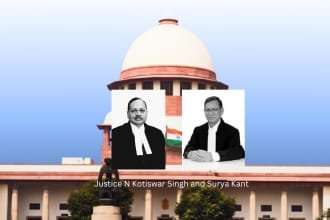In a significant ruling that reaffirms the judiciary’s role in upholding constitutional freedoms and not engaging in moral policing, the Supreme Court of India on April 8, 2025, set aside the ₹10 lakh costs imposed by the Punjab and Haryana High Court on musician Vishal Dadlani and political activist Tehseen Poonawalla for their tweets criticizing a Jain monk in 2016. The apex court held that courts are not guardians of morality and should refrain from using their jurisdiction to punish individuals for expressing opinions, especially when no criminal offence is made out.
Background of the Case
The controversy dates back to 2016 when Jain monk Tarun Sagar, a Digambara Jain monk known for his nude appearances as part of his religious tradition, addressed the Haryana Legislative Assembly. The monk’s presence and speech in a legislative setting sparked a public debate on the intersection of religion and governance.
Vishal Dadlani and Tehseen Poonawalla posted critical tweets expressing their disapproval of the monk’s appearance in the assembly. Dadlani, known for his outspoken secular views, tweeted against the presence of religion in legislative affairs. Poonawalla raised a pertinent question regarding societal hypocrisy, asking why women are shamed for being semi-nude while monks are hailed as holy for appearing nude.
These tweets, though later followed by apologies and clarification from the duo—Dadlani even met the monk in person—drew the ire of some individuals. A third party, not directly involved with the Jain community, filed a criminal case accusing them of promoting enmity between religious groups and outraging religious feelings.
High Court’s Moralistic Approach and Imposition of Costs
In 2019, the Punjab and Haryana High Court quashed the FIR against Dadlani and Poonawalla, acknowledging that no criminal offence had been committed. However, despite this, the Court went on to impose a hefty cost of ₹10 lakh each on the two for what it termed “mocking a religious head to gain publicity.”
The High Court, in its ruling, stated that the costs were being levied to deter individuals from making such comments on religious leaders in the future. The judgment was widely criticized for going beyond the legal question and venturing into the territory of moral judgment, effectively punishing individuals even after acquitting them.
Supreme Court’s Strong Rebuke
The matter reached the Supreme Court through an appeal filed by Tehseen Poonawalla. A Bench of Justices Abhay S. Oka and Ujjal Bhuyan heard the case and delivered a sharp critique of the High Court’s reasoning.
“No notice is served. What kind of order is passed? Court should not go on moral policing. This is not function of the court at all,” the Bench remarked orally, making its stance clear even before the final order.
In its judgment, the apex court emphasized that once the High Court had concluded that no offence was made out under any criminal provision, it had no business exercising its “advisory jurisdiction” or moral authority over the appellants.
“The function of the court is not to do moral policing,” the Supreme Court categorically stated, highlighting that the High Court appeared to be swayed more by sentiments than by legal reasoning.
The apex court also noted that the High Court seemed influenced by the fact that the tweets were directed at a religious leader, which is an extraneous consideration when no law was violated.
Court’s Role in a Constitutional Democracy
This judgment reinforces the principle that courts are meant to protect rights, not moralize behavior. In a secular and democratic society governed by the rule of law, the judiciary must act within the confines of the Constitution. Free speech, even if critical or uncomfortable, is protected under Article 19(1)(a) of the Constitution of India.
The Supreme Court’s decision sends a clear message that criticism of religion, religious leaders, or religious customs—so long as it does not amount to hate speech or incitement to violence—cannot be penalized. The right to dissent is a cornerstone of Indian democracy, and courts must be wary of stepping into the realm of cultural or religious gatekeeping.
Apologies and Forgiveness
It is noteworthy that both Vishal Dadlani and Tehseen Poonawalla expressed regret for their remarks. Dadlani not only publicly apologized but also met with Tarun Sagar to personally seek forgiveness. The monk, now deceased, had graciously accepted the apology and stated that both individuals were ignorant of the Jain way of life, thereby closing the matter from his end.
Despite this, the legal process was pursued by a non-Jain third party, underscoring how outrage and legal complaints are sometimes weaponized even when those directly involved have reconciled.
Conclusion: A Win for Free Speech
The Supreme Court’s verdict is a landmark affirmation of judicial restraint and the right to free speech. It draws a clear boundary between legality and morality, emphasizing that courts are arbiters of law, not enforcers of cultural or religious norms.
The ruling also serves as a precedent against the arbitrary imposition of punitive costs in cases where no legal wrongdoing has been established. It safeguards citizens from being silenced by the fear of disproportionate consequences for expressing their views on social media or other public platforms.
By setting aside the ₹10 lakh costs and strongly disapproving of the High Court’s approach, the Supreme Court has upheld the principles of constitutional democracy and free expression in India.


